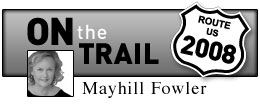
"Pray -- Fast --Vote." So Brady Boyd tells his flock at New Life Church in Colorado Springs the Sunday before voter registration closes in the Centennial State. "Be a good citizen," Pastor Boyd admonishes. "If you don't vote, you're worse than a puppy kicker." Volunteers are waiting in the church foyer to assist the morning's congregation with registration, so that the dilatory won't be in danger of committing a sin of cruelty, much less omission. At no time, however, does New Life's spiritual leader tell the 7000 waving and singing, swaying and jumping, how to vote. That is a decision everybody keeping time with the Christian rockers on the church stage will have to make for themselves.
When I interview Brady Boyd several days later, he repeats his Sunday dictum to pray, fast, vote. "There's more angst on this election than I've seen in twelve to sixteen years," he says. "But I won't endorse a candidate. . . . There are people on both sides of the aisle who represent our values." I ask Pastor Boyd exactly what those values are. "Biblical values," he says. Which biblical values? In answer, Boyd replies, "Not to be mean or nasty or contentious. To meet the need that comes across our path. And we can't pick and choose whom we help."
 Boyd is echoing his Sunday sermon on the story of the Good Samaritan, which he recasts as a town hall meeting in which Jesus takes questions. How to live a good life? Follow the first two Commandments, Jesus says. "But," Pastor Boyd observes, "it is much easier to love God than to love your neighbor." Certainly, the final fraught days of this election would seem to bear out the wry comment. "Neighbors -- they aggravate us; they drive us nuts; they don't wish us well sometimes." We live in a circular world of family, friends and like-minded folk who believe exactly as we believe. We leave very little room for anyone else, Boyd points out -- and find it hard to open a door to someone radically different.
Boyd is echoing his Sunday sermon on the story of the Good Samaritan, which he recasts as a town hall meeting in which Jesus takes questions. How to live a good life? Follow the first two Commandments, Jesus says. "But," Pastor Boyd observes, "it is much easier to love God than to love your neighbor." Certainly, the final fraught days of this election would seem to bear out the wry comment. "Neighbors -- they aggravate us; they drive us nuts; they don't wish us well sometimes." We live in a circular world of family, friends and like-minded folk who believe exactly as we believe. We leave very little room for anyone else, Boyd points out -- and find it hard to open a door to someone radically different.
"These are critical times to be salt and light," Boyd tells the congregation. "We're in an economic crisis -- and this is our finest hour! To get out of our circular world -- to pay our neighbors' house notes, to provide food. We're going to help the poor, the [military] widows and orphans. We were called to a season such as this -- to be salt and light. . . . We are committed to the needs of people around us," even when, Boyd quips, such a neighbor might be "a very-left politician!" A howl of knowing laughter rises from the tiers on the far side of the dimly lit amphitheater, with its ring of huge flat screen monitors and overhead ganglia of starship electronics more like a rock concert arena than a church sanctuary.
Brady Boyd's sermon on the parable of the Good Samaritan dramatizes the shift in American Evangelical thinking that is playing a part in the 2008 Election. For two decades, James Dobson's Focus on the Family has reigned from its hilltop campus in "The Holy Land," as the local Obama operatives call southern Colorado Springs. Recently, however, younger Evangelical leaders in the Springs have begun to eclipse Dobson. On a word from John Morris, the chairman of the El Paso County Democratic Party, I spend a few days checking out New Life Church and its pastor Brady Boyd. Morris's view that "Boyd is not so much about Armageddon" proves true. The congregation and leadership at New Life have more urgent considerations these days than End Times. The change in vision and consequent action -- to "go" and to "do," as Brady Boyd frequently quotes the Jesus of Luke's Gospel -- is a return to an old relationship between faith and the public square that likely will influence politics locally and nationally for years to come.
A few miles south of Focus on the Family, New Life perches on its own hilltop acres. Like the longer-established Saddleback Church in Lake Forest, California, whose pastor Rick Warren brought his two friends McCain and Obama together for a Saturday night hour of soul-searching, New Life displays all the rawness and hasty architecture of a frontier town. For both mega-churches, parking lot placement and the space to lay more asphalt are primary. Memberships are young and expanding -- who knows how fast and how far they will grow? The flock at New Life is very young -- the Sunday I attend services most everybody is under fifty -- and I spy teenagers sprawled or sitting cross-legged in every nook and cranny. On my first visit to the campus, I follow a group of high schoolers into the World Prayer Center, a second worship hall, half-circled by the flags of nations, that juts from the New Life hill like the prow of a ship. The kids have come to hang out and to peck at their Apple laptops. I've come to poke around.
Internet age faith glows from the flat screens ringing the round-walled realm. Somewhere, everywhere, supplicants type at worldprayerteam.org, which sends out their words like digital prayer flags into the blogosphere. A Haitian orphan pleads for "the lost people in Perth." "Have mercy on our lives in this city," beseeches someone from New York. "Set those people free" in San Francisco. Sasha in Russia gives both the details of his life and the beauties of Orthodox invocation. A father is mindful of a daughter at the homecoming dance. Darla in Illinois thinks of Barack Obama: "Guide and protect him until his term is finished." Meanwhile stories of discipleship from Belgium, Bhutan, Bolivia, Brazil, Bulgaria, Burkina Faso, Burundi and so on into the Cs -- Cambodia, Cameroon, Canada, Central Africa -- unfold in looping ribbons of trailer. Like Saddleback, New Life is keenly aware of its fit into the world at large, and if Brady Boyd doesn't have Rick Warren's wherewithal for world missions (ministering to "spiritual emptiness, self-centered leadership, poverty, disease and illiteracy" in countries as diverse as Rwanda and Ukraine), he does remind his flock of America's place. "I grew up poor," he says, "but by that I mean America-poor -- we always had a solid roof over our heads -- not third-world poor."
Watching the streaming prayers soothes and calms, for I have just seen something to upset an old-school Presbyterian. Teetering on the ledge of the sound and lighting booth at the back of the room is a half-used tray of communion wine, its thimbles of juice with frayed pull-tops like the little Smuckers jam jars abandoned with the room service remains in a hotel hallway. Every person of faith has his or her Wittenberg moments. For me in Colorado, it is the casual treatment of a sacrament. For Brady Boyd and New Life Church, it is "the 50 million children who have been aborted." The wine incident is a reminder of how differently and quixotically people take stands on matters of belief. Likely, many of the 10,000 active congregants at New Life Church will vote "yes" in November on Colorado constitutional amendment 48, which expands the definition of personhood to include "any human being from the moment of fertilization as 'person,'" endowed with "inalienable rights, equality of justice, and due process of law." (Amendment 48 is not expected to pass.) The New Lifers are just as conservative on issues like abortion as older Evangelicals, even as they prioritize a different social gospel; but they are less interested in implementing change through the political process than through hands-on work with those sometimes-pesky neighbors.
Encountering New Lifers, I witness a dispassion about politics at odds with the "angst" about which Pastor Boyd speaks. "We trust God for the future of our country," Boyd says. This is the third biblical value he answers me, along with civility and helping others. It's a sentiment the members of his congregation often repeat. Bernadette, an immigrant from West Africa and a regular at New Life, gives this declaration of faith a special twist. George Bush has not been a good president, she says, but "it hurts" -- she touches her heart -- "how people talk about him. We should pray for him, that God may lift him up." Bernadette and her friends, two African-American sisters who do military work, are thinking aloud, for my consideration, about their choices for president. The sisters, who are Republicans, are slowly coming around to the idea that they might vote for Barack Obama. They've seen the effects of war; they want the country out of Iraq the sooner. "The President, who he is," Bernadette cautions me, "it is God's will. And we will pray for him."
Three days later, when I tell Pastor Boyd that I've met a few New Lifers who are voting for Obama, he seems taken aback. Because I've approached some in his church to discuss politics? Or because congregants are taking his dictum literally and deciding for themselves? After all, he has just told me that "Evangelicals are not one big robotic voting block," that they are "independent thinkers, critical thinkers." We move on to talking about age demographics. I describe my astonishment that everybody at New Life seems to be under the age of forty. He assures me that the church has older members, too, particularly among the Catholics who attend traditional Mass on Saturday night and then come to the hill on Sunday morning. Brady Boyd has recovered his equanimity. "We Evangelicals," he says, "we're no longer the old guys who are mad at everybody."
